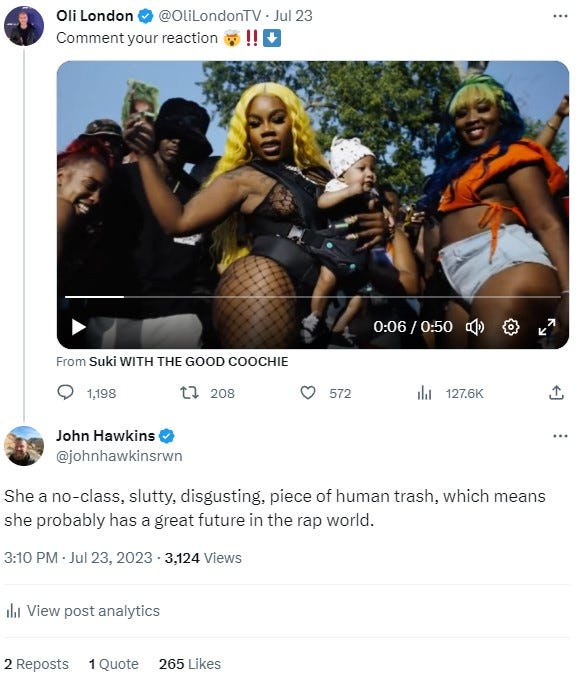America Needs a Lot More Shame
Shame isn’t an unhealthy just because it makes you feel bad.
Once, many years ago, I had a conservative woman write me to ask what I thought about her being on welfare. It has been a long while, so the details may be a touch off, but the gist of it was that her husband had lost his job and both of them were scrambling to make money. They felt like they genuinely needed to take welfare to get by right now and feed their kids. She said she felt ashamed of being on it, but hoped they wouldn’t need to be on it much longer. She said that she wondered if they should just say, “damn the consequences,” get off welfare even though they were qualified for it, and go from there.
What I told her in response may not be what you expect.
It was essentially, “It’s a government program, you’re qualified for it, you need it, and you feel bad about being on it. Stay on it, get back on your feet, and then do your best to never have to get back on it again.”
The “feel bad about being on it” part was critical for me because you’re SUPPOSED TO FEEL BAD about taking charity from other people. That doesn’t mean you don’t need it and it doesn’t mean they shouldn’t give it.
In fact, to the contrary, people who feel like they’re owed handouts are exactly the sort of people who shouldn’t get them, while people who feel like they have a responsibility to take care of themselves and thus, feel bad about getting handouts are exactly the sort of people who we should want to give handouts to as a society.
Why? Not because we want people to suffer, but because people who feel appropriate levels of shame for letting others down are the sort of people who help make a good society. They’re the sort of people who are going to bend over backward to get off welfare as soon as possible, work doubly hard to never get back on it again, and then feel a bit of gratitude if they ever get in a position to help someone else out who was in the same position that they were one day down the road.
When you take shame out of the equation, the whole process breaks down. You wind up with entitled bums feeling like the world owes them a living, people who resent giving because they feel like they’re being taken advantage of, and an attitude of, “Who’s being gamed here?” instead of, “We’re all in this together.” Dogs pulling on the same sled are in this together, but dogs and the fleas that feed off of them are natural enemies.
We got to this position as a society for a couple of reasons.
The first was that we were bothered as a society by the people that were racked with shame for things that weren’t their fault. The color of their skin, the failings of their parents, or trying their best and failing are not things people should feel shame over. We didn’t want kids to feel bad about themselves because their parents couldn’t afford to buy them lunch. We didn’t want wonderful human beings feeling like they were awful because mommy or daddy said, “You’re a bad person” a few times in their childhood instead of, “You’re doing a bad thing, stop it.”
However, our solution to that was not to emphasize what it was appropriate to feel shame over and what wasn’t, it was to try to nuke the whole concept of shame altogether. After all, we couldn’t have people feeling ashamed, right? That could create low self-esteem and that’s supposed to be bad, right? We decided that we should be teaching everyone that they’re great just the way that they are. Who are we to judge? Whose “morals” are we supposed to enforce? Christian morals? What if we’re not Christian? Traditional American morals? Well, we know all of those weren’t right. People used to be okay with slavery and letting small children work in the coal mines. We decided to forget about all that and say, “I’m okay and you’re okay” and “If it feels good, do it.” The idea was to move past shame and make sure everyone had nice, high self-esteem.
Except again, shame is USUALLY a healthy emotion that helps hold a society together. When you banish it, you end up with a society overrun with amoral narcissists who believe everything they do is good just because they do it.
Against that backdrop, came a social media-driven cultural shift. Suddenly, becoming “famous” and “getting attention” became two of the most valued things in American society. Everybody wants those likes. Everyone thinks that a viral post that may “make them a star” is right around the corner. Except the competition for attention is almost impossibly crowded:
The USA has 302.35 million social media users as of 2023. That means 90% of the total US population uses social media actively.
When you’re competing with 300 million people in the United States for attention and 4.9 billion people around the world, guess what? Shame is a huge competitive disadvantage. It keeps you from getting nearly nude and posing provocatively to get men to look at you. It keeps you from just telling people whatever they want to hear instead of the truth. It keeps you from coming up with that particularly cutting insult to deliver to some stranger that will get you more likes.
There was a time in America when people would have felt ashamed of masturbating, wearing a low-cut shirt in public, or publicly saying a curse word.
Now most people consider those sorts of views antiquated. In fact, most people in our society have become increasingly unashamed of anything. After all, that’s what they were taught, and they think it helps them get that sweet, sweet attention on social media that they crave so much.
Except, you’re supposed to feel bad about begging, shame because of lying, and embarrassed about making a living as a stripper, prostitute, or thief. You’re not supposed to feel good about tossing juvenile insults at people, laughing at other people’s misfortune, and flashing your body to the world to get attention. You’re not supposed to feel good about being obnoxious or weird to get noticed, spending your day getting drunk or high, or going along with the crowd when they’re wrong to try to make them like you.
You’re not supposed to feel terrific about having all of your marriages tank:
You’re not supposed to feel good about yourself for getting abortions:
You’re not supposed to be proud of rapping about your vagina and twerking with a group of women while you hold a baby:
You can’t be a good person if you don’t feel bad about doing bad things. Shame is really just your conscience telling you that you’re going in the wrong direction. Without shame, you can’t be a good neighbor, a good parent, a good citizen, or a good person.
If our society has to give up shame for the many that deserve it so that the few that don’t no longer have to feel bad, it’s far too high of a price to pay. America has an immense shortage of shame and until that changes, our country is destined to keep degrading.





Government shouldn't be in the business of charity *at all*. That said, charity isn't a bad thing in and of itself. I just happen to believe it ought to be voluntarily executed between private (i.e. non-government) parties.
I feel shame for my country, and her people - both the shameless and those who are too timid, too fearful to speak up against it. The former are a small but noisy coalition. If the majority refused to tolerate them and their shameless behavior, we would have a lot less of it.